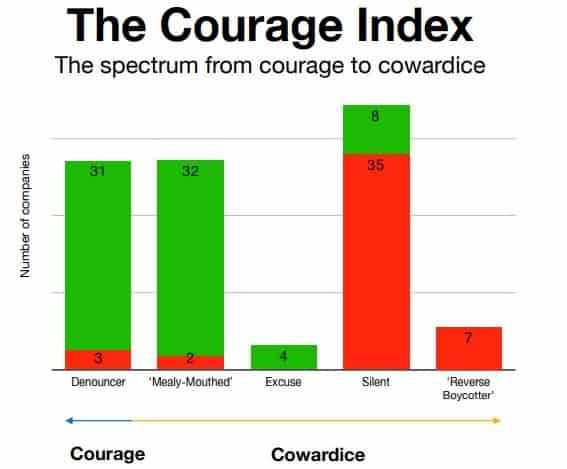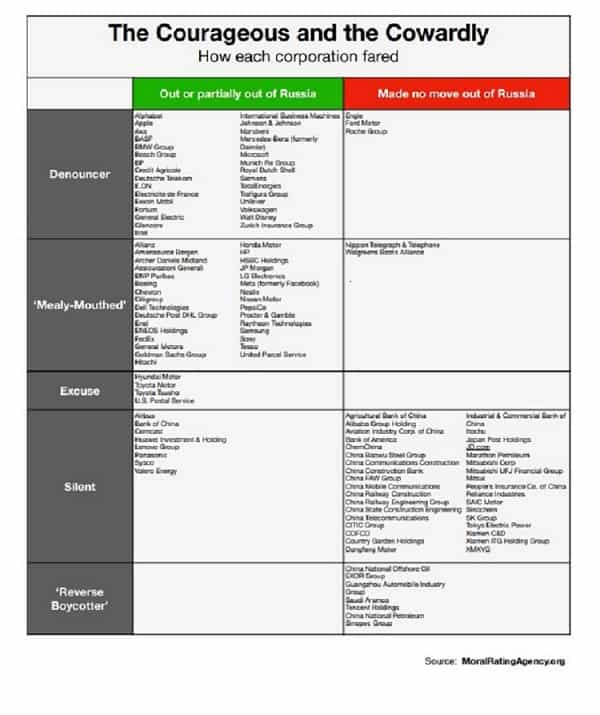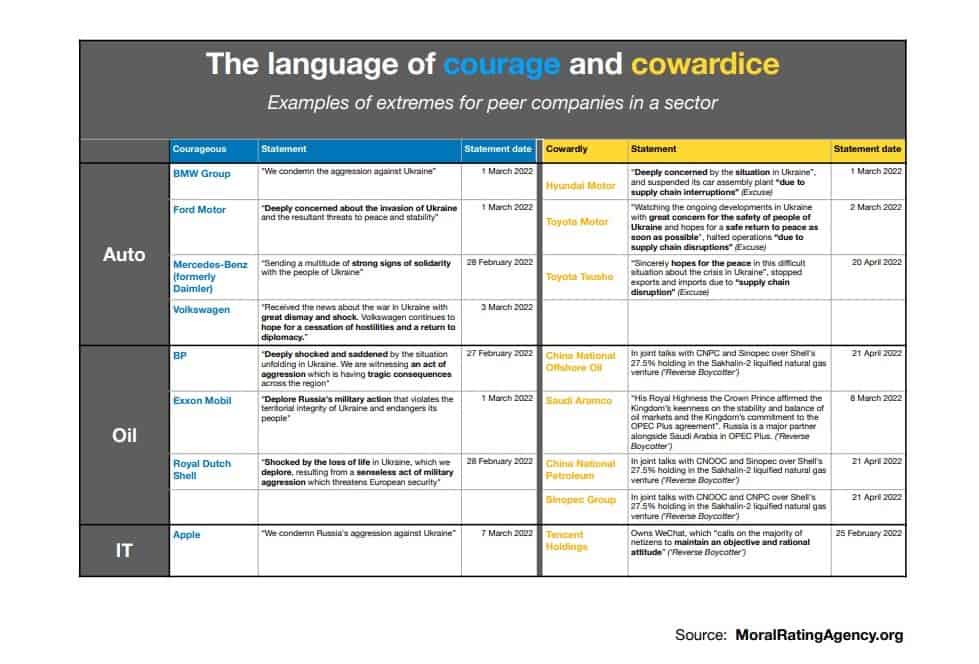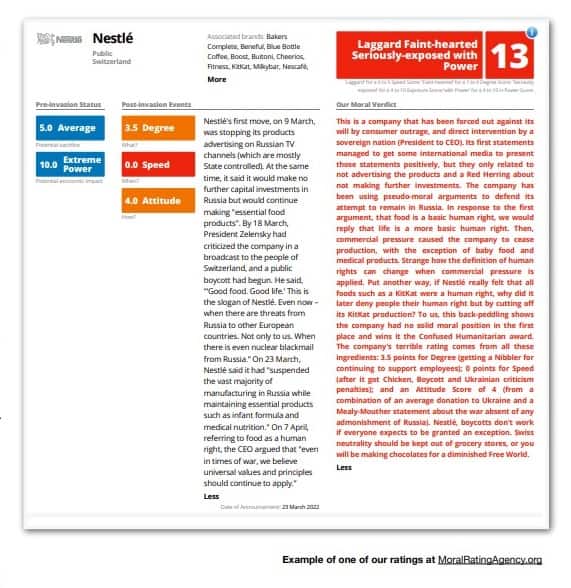Their investigation shows that companies are afraid of denouncing Russia, revealing only a small portion of corporations have the guts to denounce Russia. Only 28% of companies that were involved in the country have denounced its invasion of Ukraine. The remaining 72% avoid confronting the issue by making “mealy-mouthed” statements, or excuses that don’t mention the war, or they maintain total silent or, in some cases, show solidarity with Russia.
In the Moral Rating Agency (MRA) “Courage Index,” they congratulate the 34 denouncers and expose the 88 cowards. The corporate watchdog’s main mission is to expose companies for the degree to which they have cut ties with Russia. This latest report focuses on words, and whether words match actions. The MRA’s ratings on corporate involvement in Russia are disclosed at MoralRatingAgency.org.
The MRA’s “Courage Index” classifies statements denouncing Russia as “courageous.” “Cowardly” communications cover statements that are “mealy-mouthed,” contain alternative excuses that don’t refer to the invasion, show solidarity or increased involvement with Russia, or cover companies remaining silent about the invasion.
The 88 cowardly corporations, which the MRA calls “yellow bellies,” account for 72% of the 122 largest companies involved in Russia (122 of the top 200 corporations in the world had trading and/or investment activities in Russia at the time of the invasion). The 34 companies denouncing Russia accounted for just 28%.

Don’t mention the war
Mark Dixon, founder of the MRA, said: “There are a lot of temptations to be a corporate chicken and not call out Russia. We believe the main driver among those leaving Russia is to keep their options open in the future if there is a ceasefire. Companies know they will burn their bridges if they denounce Russia or Putin. They are acting commercially not morally.” Companies still in Russia generally find it too hypocritical to speak up.
“Companies opt to denounce Russia for two reasons. Some put morality above money. Others think they won’t be going back to Russia while Putin remains in power and decide to profit from the moral kudos of speaking up. We don’t care if a company denounces Russia out of moral outrage or the commercial benefit of looking moral. The important thing is that Russia should be universally considered a pariah.”
The most common response from yellow-bellied companies was a “mealy-mouthed” statement (32cases). Companies making a move out of Russia that don’t want to confront Russia directly chose this type of watered-down wording. Such statements refer to the war being tragic or a humanitarian disaster without citing Russia as the invader or otherwise admonishing the regime. It is noteworthy that these 32 companies, which were forced to reduce ties because of world criticism of Russia, didn’t voice any criticism of Russia themselves.
For example, HSBC said, “Our thoughts are with all those impacted by the continuing conflict in Ukraine”; Dell said, “It’s a great tragedy and very disappointing to see a humanitarian disaster”; and Chevron CEO Michael Wirth spoke about the “tragic situation” in Ukraine (Reuters) while the company retained its shareholding in the Caspian Pipeline Consortium which transports Russia oil to world markets.
There were four cases of companies explaining their exits from Russia with reasons such as supply chain problems. There were seven cases of companies classified by the MRA as “reverse boycotters”: showing solidarity with Russia by increasing involvement with the country or making supportive statements. For example Tencent, which owns WeChat, issued a statement admonishing users who commented on the invasion on the grounds it undermines a “clean cyberspace”; Saudi Aramco’s shareholder Crown Prince Mohammed bin Salman showed commitment to OPEC Plus, where Russia is Saudi Arabia’s main partner; and China National Offshore Oil, China National Petroleum, and Sinopec moved in the reverse direction of boycotts by discussing the purchase of Shell’s stake in “Sakhalin-II.”

Silence is rotten
Silence, as would be expected, was the choice of companies not making the move out of Russia. However, it was also the choice of some companies making partial exits from the country. Airbus, Comcast and Panasonic moved as quiet as a mouse. Even Sysco and Valero Energy, which cut all links with Russia, did so quietly. The rare Chinese companies that did make partial withdrawals from Russia – Bank of China, Huawei and Lenovo – expectedly followed the same approach.
Mr. Dixon said: “Moving out of Russia without saying a word is the depth of cowardice. When a company slips out silently, or otherwise avoids the elephant in the room, it undermines the exodus momentum by diluting peer pressure. Global consensus is fragile and must be strengthened at every opportunity. Our position is that words matter, and silence is complicit.”
Fighting words
34 companies denounced Russia, some of which showed significant moral courage. Shell said, “Shocked by the loss of life in Ukraine, which we deplore, resulting from a senseless act of military aggression which threatens European security.” Microsoft said, ”Like the rest of the world, we are horrified, angered and saddened by the images and news coming from the war in Ukraine and condemn this unjustified, unprovoked and unlawful invasion by Russia” and added, “Like so many others, we stand with Ukraine in calling for the restoration of peace, respect for Ukraine’s sovereignty and the protection of its people.” Microsoft’s suggestion that much of the world was likewise denouncing Russia was optimistic since the MRA found that only 28% of companies spoke up properly, putting Microsoft in the minority of companies doing so.
Shell’s strong statement within days of the invasion deserves special credit. Mr. Dixon said: “Shell is the 14th most exposed company in the world to Russia. It took a moral stand even though it had a lot to lose. Putin’s July 1st degree to expropriate the Sakhalin II gas and oil project from Shell and others wasn’t a mere coincidence.”

Chickens with little to lose
Mr. Dixon continued, “The corporations with yellow bellies often have negligible exposure to Russia. The coward with nothing to fear is the most cowardly of all.”
The MRA accused the following companies, which made some moves out of Russia, of being cowards with negligible risk: Allianz, Chevron, Generali, Deutsche Post DHL and P&G all made “mealy-mouthed” statements, US Postal Service made excuses, while Sysco remained silent. The low exposure level of the companies is shown at MoralRatingAgency.org.
Ironic statements
There were three cases of companies denouncing Russia which remained involved with the country. It is unclear if they were hoping to get credit for words rather than actions. In any case, the contrast between words and actions is stark. Importantly, all three companies used the word “invasion” in their statements.
Ford Motor retains its ownership in car production and hasn’t made any plans to divest, despite saying it was “deeply concerned about the invasion of Ukraine and the resultant threats to peace and stability.”
Engie continues to import Russian gas and LNG, yet it said it “condemns the invasion of Ukraine and expresses its support for the affected people.”
Meanwhile, Roche Group continues to export to Russia, but said it “vehemently condemns the violent invasion of the country.”
National trends
While most of the cowards among Western companies opted for “mealy-mouthed” statements, East Asian companies – Chinese, Korean and Japanese – tended to opt either for silence, making excuses or even “reverse boycotting.” Indeed, the topic of the invasion appears entirely off-limits in China and, in other Asian countries, it seems acceptable to avoid it.
In cases where a corporation issued several statements about Russia, the MRA classifies the company on the basis of its first statement.

Moral Rating Agency
The Moral Rating Agency was set up to get Russia out of Ukraine and use this momentum to help pro-democracy Russians get Putin and his regime out of Russia. Later, it plans to cover corporate unethical actions on other critical political issues.
In addition to exposing, and crediting, corporations through moral ratings, the MRA maintains an Indelible Ledger of a company’s actions so any later corrective actions do not wipe the slate clean. Time is of the essence, so the rating system includes a disincentive for delay through exposing and tracking what preceded a later corrective action.
Unlike ESG (Environmental, Social and Governance) rating agencies, which have a commercial responsibility to their institutional investor clients to cover the range of issues these clients wish, the Moral Rating Agency is zeroing in on a single corporate moral issue, in this case the Russia-Ukraine war.
The MRA was founded and is led by Mark Dixon, who runs the mergers & acquisitions consultancy Thinking Linking in the City of London and New York. He was one of the co-founder of the online financial commentator BreakingViews.com, which is today part of Thomson Reuters. Mark has been opposed to autocratic regimes, particularly to the Chinese government and to Putin’s transformation of Russia from a nascent democracy into a fully throttled autocracy. He has a personal connection with Ukraine because he has owned an apartment in the city of Lviv since 2010. He has also lived in China.
The MRA has a paid staff of moral raters, verifiers, and fact-checkers who operate according to its Rating Methodology. It also has an on-site team involved in statistics, media relations, site production and publishing.
The MRA has no customers, external commercial relationships, or conflicts of any kind. It will rate and publish so that consumers, media and governments can judge companies on a single topic on a fair basis. This objectivity on individual companies and their relative scores is maintained despite the campaigning nature of the agency, as explained in Rating Philosophy.
WHAT TO TAKE AWAY FROM THIS ARTICLE:
- The 88 cowardly corporations, which the MRA calls “yellow bellies,” account for 72% of the 122 largest companies involved in Russia (122 of the top 200 corporations in the world had trading and/or investment activities in Russia at the time of the invasion).
- Such statements refer to the war being tragic or a humanitarian disaster without citing Russia as the invader or otherwise admonishing the regime.
- For example Tencent, which owns WeChat, issued a statement admonishing users who commented on the invasion on the grounds it undermines a “clean cyberspace”.























